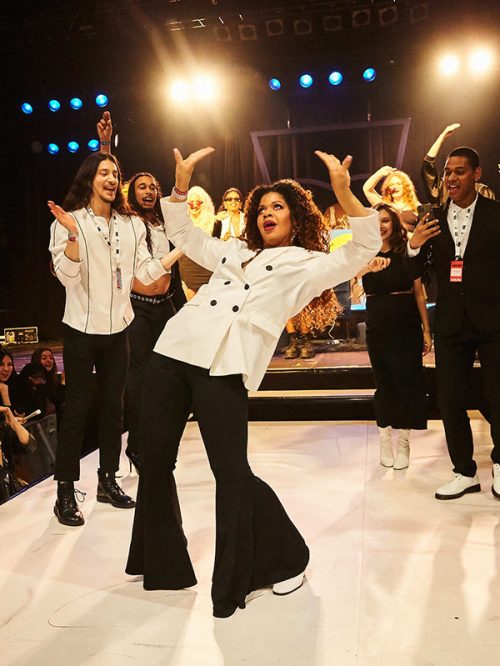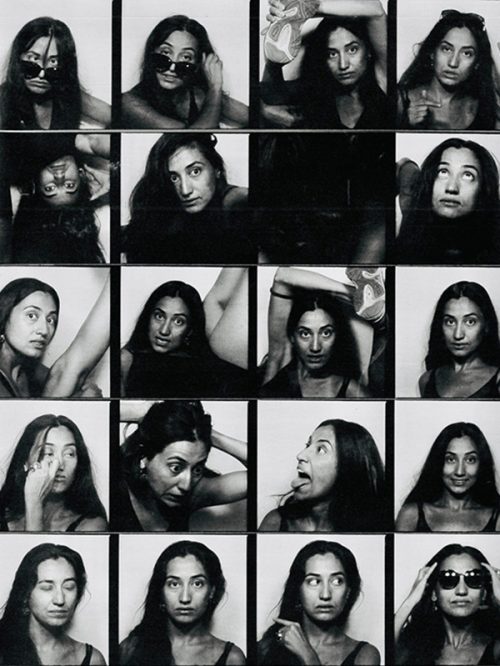About the “White Gaze” – Sabine Sörgel interviewed by CHAKKARs
Sandra and Sarah: Dear Sabine, we are delighted that you had the time and inclination to continue our exchange on ‘White Gaze’ for the eZine in the form of this interview! . Here is our first question:
When did you first experience processes of awareness building around the “White Gaze” ?
Sabine: The term became relevant for me in the context of my dance studies research on transnationalism and contemporary dance. Especially in the debate with American colleagues who were critical of my work because of the fact that I was white and therefore questioned my point of view, especially when it came to dance forms of the African diaspora. Then, when I started reading George Yancy’s work, the question of placing the discourses that constitute my view as white at the center of the analysis became more and more urgent. Whether I liked it or not, I saw it as a kind of exercise, even though I wasn’t initially interested in that aspect of dance theater. And it is also interesting that I am still dissatisfied with the fact that an analysis based solely on identity politics keeps the phenomenon of dance far too small and, although it is important to repeat it, it only tells the same story over and over again without abolishing racism in itself.
The way in which theater, film and television have taught us to see hierarchically of course plays a major role in the Western tradition since the Renaissance, which is closely linked to the history of colonialism, conquest and white supremacy. What I find interesting is that many of these racist perceptions have become engrained in our cultural subconscious, where they live on quasi invisibly, and then unfortunately break out and break through again and again with violence. Systemic racism would not be possible without the role that this cultural subconscious plays as a shadow of Western capitalist society, especially now, when xenophobia and violence are once again becoming acceptable in public and are being heated up in the media by stereotypical representations of the so-called other as the ” Feindbild” (image of the enemy).
Sandra and Sarah: Can you describe what that did to you emotionally?
Sabine: I think that for a long time I also wanted to deny that I had a white bias in the world because I was brought up to think in an anti-racist way. Racism was a taboo in Germany of my generation, I was thirteen years old when the Berlin Wall fell. Somehow you think you can control it just by critically coming to terms with and publicly condemning National Socialism in remembrance of the incomprehensible crimes of the Holocaust and a promise of “never again”, which Germany has now unfortunately bid a bitter farewell to in view of what is now happening again here in Germany.
Behind this mask of tabooing racism, as I would see it today, any awareness disappeared for a long time and especially the confrontation with German colonialism, which has only really begun now. And so I also first learned to think differently about racism in connection with US-American history and then also the experiences during my doctoral thesis in Jamaica on the dance theater of the Caribbean.
The desire not to be racist oneself, as the grandparents’ generation in Germany had been, harbored the naivety of imagining oneself to be beyond race and racism. Spared by history, as the saying goes, by the grace of late birth. So you were less German and more European and yet at the same time inscribed in privileges and power relations that gave white people disproportionately easier access to education, wealth, etc. due to these historically grown structural differences.
Emotionally, it feels like you’ve been fooling yourself your whole life and lying in a way. And that, of course, you’d prefer it to be different and it thereby takes longer than you probably admit to accept that you benefit from something that simultaneously keeps you trapped in this role and in the patterns of ugly racism.
Then, it’s not easy to get rid of it in the second step, just as the reverse is also true. Where do I hand it over, my white privilege? You can’t just swap it and if you could, you would probably want to keep it. That’s the crux of the matter that we continue to grapple with and try to give these privileges to as many people as possible, but that’s not exactly how it works either and it brings us full circle to the comprehensive social criticism that would have to imagine a whole new world order. But we are further away from that than ever, it seems.
And to be honest, I am still at this somehow very perplexed point today and it feels, how can I put it, damn cowardly: how do we get out of the field of vision of white discourses? What am I doing to break through white hierarchies? Not much, never enough.
And yet, despite all the daily failures at this point, dance plays a very important role for me, because dancing is not just about being seen, whether on stage or in a movie, but about feeling yourself. It opens up worlds beyond the gaze, which I think are particularly important for overcoming racism and racist thinking.
Sandra and Sarah: Thank you Sabine for these detailed, unrelentingly honest reflections! Do you have one or two concrete examples of how this has transformed your seeing and writing?
Sabine: The realization of having a white gaze and also knowing that this is structurally inherent in me as well as being constantly enforced by the way in which visual worlds are staged now helps me at least critically question all of this again and again. By this I mean that such a critical awareness of white gazes automatically calls their power into question, because it no longer remains invisible, but points to itself as something that needs to be changed. In the analysis, I no longer try to be objective, but to name my own prejudices as such. In this respect, there is no knowledge I can have of dances from another culture other than what I make my own. However, I see this subjective appropriation less as something morally reprehensible and more as a radically honest confrontation with myself and the other in the shared experience of various dance worlds.
In a way, what I have tried to write about contemporary African dance is exactly that, this reversal in which I am no longer interested in describing African dances objectively, but in letting them affect me subjectively and thus presenting my white issues as such to my readers, if that makes sense.
Ultimately, I also believe that I have left the academic world behind me because the academic study of dance in this context still seems too colonialist and less interesting than the artistic collaboration with dancers as a critical decolonizing practice of changing oneself in this context.
Sandra and Sarah: Do you want to add to the specific connection you see between dance/theater and the White Gaze?
I think I’ve already answered that, but I should also say that dance beyond theater has the stronger anti-racist practice of constantly disrupting white gaze, since theater as such was built to establish colonialist domination and ways of seeing. This begins with Louis XIV and ends in Bayreuth, to exaggerate.
Sandra and Sarah: Do you have an impulse for a dance audience to initiate their own awareness processes for “White Gaze”?
Sabine: In this context, it would always be important to me to no longer just watch dance sitting down, but to engage with it in a full-bodied way. How do I breathe, how do I stand in life, how do I feel the other person, beyond the image I have of him or her or how it has been conveyed to me by the media – it would be very important to have these experiences as a dance audience in order to approach oneself and each other beyond the gaze and skin color.
Sandra and Sarah: thank you so much, Sabine, for the Interview!
Bio
Sabine Sörgel holds a PhD in Performance and Media Studies from the Johannes Gutenberg University Mainz/Germany. In 2003, she conducted field research with the National Dance Theatre Company of Jamaica in Kingston, investigating postcolonial identity discourses in the context of post-independence nation building politics. From 2008 – 2012 she was a Lecturer in Drama, Theatre and Performance at Aberystwyth University in Wales, UK and from 2011-12 she received a one-year research fellowship at the Interweaving Performance Cultures Research Center at Freie Universität Berlin. From 2013-2019 she was a Senior Lecturer in Dance and Theatre at the University of Surrey in Guildford, UK and program director of the BA Dance and Culture program there. Since then she has worked as a freelance researcher, dramaturg and writer. Her publications include Dancing Postcolonialism – The National Dance Theatre Company of Jamaica (2007), Dance and The Body in Western Theatre. 1948 to the Present (2015) and Contemporary African Dance Theatre: Phenomenology, Whiteness, and the Gaze (2020). October 2021 – July 2022 she was a Research Fellow at the Käte Hamburger Center for Advanced Study in the Humanities Global Dis:Connect at the Ludwig-Maximilians-University Munich and has been director of the Academy at tanzhaus NRW, Düsseldorf since 2023.








